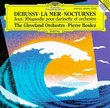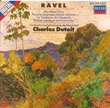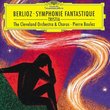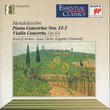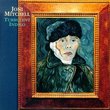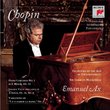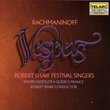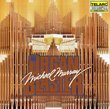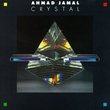| All Artists: Bela Bartok, Pierre Boulez, Chicago Symphony Orchestra Title: Béla Bartók: Concerto for Orchestra / 4 Orchestral Pieces - Chicago Symphony Orchestra / Pierre Boulez Members Wishing: 0 Total Copies: 0 Label: Deutsche Grammophon Release Date: 3/15/1994 Genre: Classical Styles: Forms & Genres, Concertos, Historical Periods, Modern, 20th, & 21st Century Number of Discs: 1 SwapaCD Credits: 1 UPC: 028943782623 |
Search - Bela Bartok, Pierre Boulez, Chicago Symphony Orchestra :: Béla Bartók: Concerto for Orchestra / 4 Orchestral Pieces - Chicago Symphony Orchestra / Pierre Boulez
CD DetailsSimilarly Requested CDs
|
CD ReviewsOne of the very best recordings of Pierre Boulez's career. Nicholas Fox(SARAANNE.FOX@WORLDNET. | Los Angeles, CA | 11/02/1998 (5 out of 5 stars) "Any lingering stereotypes about the supposed "coldness" of Pierre Boulez's conducting should be put to rest by this stupendous recording. This may be the finest 'Concerto for Orchestra' ever recorded, with the great Chicago Symphony at their virtuosic best, and Boulez illuminating the tumultuous emotions of this piece like no other conductor. At times despairing, yearning, happy, humorous, gloomy, and ultimately triumphant, Boulez, with this recording, confirms his stature as one of the century's great conductors." A fine digital selection George Grella | Brooklyn | 08/31/2002 (4 out of 5 stars) "This is an excellent Bartok CD, in part because of the nice and unusual coupling. The Concertio for Orchestra is often found on CD with the Music for Strings, Percussion and Celesta, but the Four Orchestral Pieces, which make an informal symphony, is an apt companion. This is especially true with this recording, where Boulez's way with this great orchestra is immensely colorful and dazzling. One of the most enjoyable Bartok works.The Concerto for Orchestra is an excellent performance. While nothing reaches the heights of the classic Reiner recording with this same orchestra, this is as good as one will find with a digital recording. And this recording is superb, full of the attention to detail that devotees of this work will appreciate. Where Boulez pulls back in the overall performance is in the atmosphere of the opening, which is rather dry rather than evocative, but then drama is not this conductor's way. Once past those bars, this is as good as you'll hear. A Boulez fan should snap this up right away." A good Concerto for Orchestra and and Excellent Four Pieces. Noah Lambert | Chicago, IL USA | 08/10/2004 (4 out of 5 stars) "Really if you are getting this album it should be for the performance of Four Pieces. The Concerto for Orchestra is good. It is very clean and clear. I will say Reiner's take with this orchestra is better, but my favorite recording of Concerto for Orchestra is Montreal and Dutoit. The Four Pieces for Symphony Orchestra is another story. This is a major work by Bartok, and unfortunately not as well represented in recordings as much as the Concerto for Orchestra. The second time recording this for Boulez was the charm. His first recording with the New York Philharmonic is good, but it is marred by recording flaws, as well as flaws in the performance of the NY PHIL. This recording with the CSO is not only well recored, but the performances are breathtaking. I would look into this CD or another recording of Four Performances if you are interested in Bartok. If you are only looking around for a recording of Concerto for Orchestra look out for the Montreal and Dutoit performance."
|

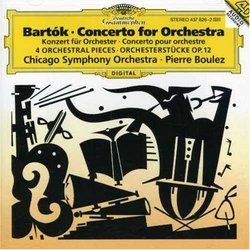
 Track Listings (9) - Disc #1
Track Listings (9) - Disc #1